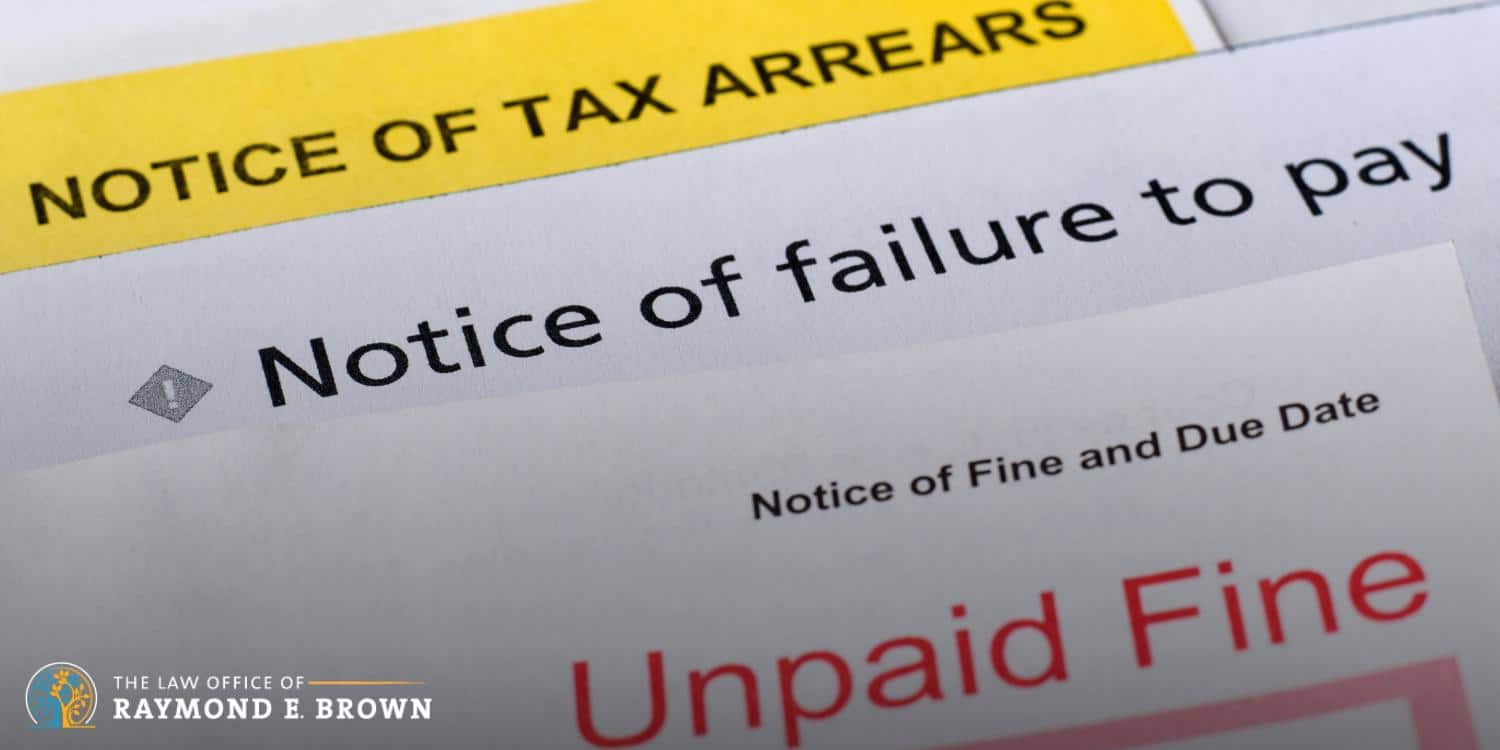When it comes to planning for the future, understanding the capabilities and limitations of a last will and testament is crucial. In Annapolis, Maryland, esteemed estate planning attorney Raymond E. Brown often encounters clients with misconceptions about what a will can and cannot do for them. While a last will is a powerful tool that dictates the distribution of your assets after you pass away, it’s important to recognize that it doesn’t cover every aspect of your legacy and affairs.
In this blog post, our Annapolis will attorneys at The Law Office of Raymond E. Brown explore the common misunderstandings of a will’s limitations and shed light on what happens when a person dies without addressing certain elements that a will simply cannot govern.

Things a Will Can’t Do
A valid will is undoubtedly a cornerstone of any solid estate planning strategy, serving as a testament to your final wishes for the distribution of your assets. However, its reach has boundaries; there are facets of your estate and end-of-life wishes that a will alone cannot address. To ensure the entirety of an individual’s intentions are honored, additional estate planning documents may be necessary. These instruments work in conjunction with your last will to provide a comprehensive plan that can manage your affairs in the event of incapacity, dictate medical preferences, and safeguard your legacy exactly as you envision.
Below, we’ll touch on some of the things a will cannot do, and what additional estate planning documents you may need if you wish to fulfill these “blanks” that wills may leave in your plan.
Avoid Probate Court
While a last will is an essential legal document for expressing your wishes, it’s a common misconception that it can help your family members avoid the probate process. In reality, a will is like a roadmap for probate, providing the court with guidance on how to distribute your assets according to your wishes. However, the will itself must be validated by the court, and your entire estate will go through the probate process in Maryland, which can be time-consuming and potentially costly. This process is public, and it can sometimes lead to disputes among heirs, adding stress for family members during an already difficult time.
For those looking to bypass probate in Maryland, a Revocable Living Trust is the estate planning document to consider. This tool allows you to transfer your assets into a trust during your lifetime. You maintain control over these assets as the trustee, and upon your death, the property is transferred to your designated beneficiaries by a successor trustee. This transition occurs without the need for probate, allowing for a more private and expedient distribution of your estate, and sparing your family members from the often lengthy and public legal process that is probate.
Avoid or Reduce Estate Tax
In Maryland, as in the rest of the United States, the assets that you leave behind may be subject to estate taxes, depending on the value of your estate. A will itself does not have mechanisms to minimize the impact of these taxes; it simply communicates your wishes for asset distribution. As such, without proper planning, your estate might face a significant financial burden in the form of state and federal estate tax liabilities, potentially diminishing the inheritance you intend for your beneficiaries.
To mitigate the impact of estate taxes and potentially shield your assets from the federal estate tax, it’s advisable to explore other estate planning routes. Trusts, particularly certain types of irrevocable trusts, can be structured to help minimize the estate tax burden. These trusts can remove assets from your taxable estate, thereby reducing the amount subject to estate taxes.
In Maryland, tools like the Credit Shelter Trust, also known as the Family or Bypass Trust, can be used effectively to maximize the use of both spouses’ federal estate tax exemptions, potentially saving a significant amount in taxes. Properly structured and implemented, these estate planning instruments can ensure that more of your legacy goes to your loved ones, rather than to tax payments.

Provide for Incapacity
While a will is an invaluable document for outlining your wishes after death, it is not activated until the event of death and offers no directives in cases of incapacity. If you become incapacitated due to illness or injury, your will cannot dictate who should manage your finances, make healthcare decisions on your behalf, or take care of your day-to-day affairs. This gap in planning can leave your loved ones in a difficult position, potentially requiring a court-appointed guardian to make decisions for you, a process that can be both time-consuming and emotionally taxing for family members.
To ensure that your affairs are managed according to your preferences in the event of incapacity, you need to have the appropriate legal documents in place. In Maryland, this typically involves the creation of a Durable Power of Attorney and an Advance Healthcare Directive. A Durable Power of Attorney allows you to appoint an agent to handle your financial matters if you’re unable to do so yourself, while an Advance Healthcare Directive includes a Living Will and a Healthcare Power of Attorney, enabling you to outline your medical treatment preferences and designate someone to make healthcare decisions on your behalf. These documents work together to provide comprehensive protection for your well-being and assets during periods of incapacity, ensuring that your wishes are respected and your loved ones are not burdened with guesswork and legal hurdles.
Provide Funeral Arrangements
Typically, a will is not read until after the funeral has taken place, which means that any instructions regarding your desired funeral arrangements may not be discovered until it’s too late to act upon them. This can leave family members in a state of uncertainty, having to make quick decisions about funeral arrangements without guidance during a time of grief and stress.
If you wish to ensure your funeral arrangements are known and followed, it’s advisable to create a separate document specifically for this purpose. This can be a part of your estate planning portfolio, known as a Funeral Planning Declaration, or a similar document that is separate from your will. This declaration should outline your preferences for your funeral service, burial, or cremation, and can also include information about pre-paid funeral contracts or funeral insurance if you have made these arrangements. By having a dedicated document, you can provide your loved ones with clear instructions, which can be a great relief during a difficult time and ensure that your final wishes are respected.
Make Medical Decisions
While wills are crucial for posthumous matters, they are not the appropriate documents for making medical decisions on your behalf. Once again, a will takes effect only after your death and, therefore, cannot provide guidance or directives regarding your medical care during your lifetime. This can leave your loved ones and healthcare providers without instructions, potentially leading to confusion or conflict about your care should you become unable to communicate your wishes due to illness or incapacitation.
In Maryland, to ensure that your medical preferences are known and can be followed, you need to establish an Advance Healthcare Directive. This legally binding document allows you to detail your wishes regarding medical treatment and end-of-life care. It includes a Living Will, where you can specify which life-sustaining treatments you would want or do not want, and a Healthcare Power of Attorney, which designates a trusted individual to make healthcare decisions on your behalf if you are unable to do so. By having an Advance Healthcare Directive in place, you can provide clear instructions that healthcare providers are obligated to follow, thereby relieving your loved ones from making those tough decisions without your input.

Control Certain Assets
Wills play a pivotal role in estate planning, but they do not have jurisdiction over certain assets that are governed by beneficiary designations. These specific assets, which include life insurance policies, retirement accounts, investment accounts, property that is owned as joint tenancy, and even some bank accounts, pass outside of the will directly to the named beneficiaries. For instance, when you open a bank account or purchase a life insurance policy, you are often prompted to name a beneficiary who will receive the funds upon your death. This designation is legally binding and takes precedence over any wishes you might express in your will regarding those assets.
Therefore, it’s crucial to keep your beneficiary designations up to date and ensure they align with your overall estate planning goals. If the beneficiary information is outdated—perhaps due to life changes such as marriage, divorce, or the death of a beneficiary—it can lead to unintended consequences, potentially diverting assets to someone you no longer wish to benefit. Regularly reviewing and updating your beneficiary designations on all relevant accounts is an essential step in ensuring that your assets are distributed according to your current wishes, complementing the instructions laid out in your will for other aspects of your estate.
Protect Assets From Creditors
In Maryland, as in other states, assets that are distributed through a will are subject to claims by creditors. If there are outstanding debts, creditors have the right to claim against the estate before any distributions to beneficiaries can be made. This means that if you pass away with debt, your assets could be used to satisfy those obligations, potentially reducing the inheritance your beneficiaries receive.
For those interested in protecting assets from creditors in Maryland, tools such as irrevocable trusts can be a part of the solution. Once assets are placed into an irrevocable trust, they are no longer considered part of your personal estate and typically cannot be reached by creditors. This is because the assets are legally owned by the trust, not by you, and you relinquish control over them. Trusts must be structured correctly and in accordance with state law to ensure they provide the desired protection. It’s important to work with an experienced Maryland trust attorney like Raymond E. Brown to create a trust that meets your specific needs and goals, including asset protection.

Provide for Pets
Wills are designed to handle the distribution of your assets to human beneficiaries and do not directly provide for the care or ownership of pets after your death. In Maryland, pets are considered property, and while you can leave your pet to someone in your will, the will itself cannot enforce the care you wish your pet to have. Moreover, there can be a gap between your passing and the execution of the will, during which the care for your pet may be uncertain.
To ensure that your pets are well taken care of after your passing, you can set up a pet trust in Maryland. This is a legal arrangement that specifies how your pets should be cared for and by whom. In a pet trust, you can allocate funds to be used for your pet’s expenses, and you can provide detailed instructions about every aspect of the pet’s care — from their daily routine to their medical needs.
The trust can also designate a caregiver and a trustee, who will be responsible for managing the funds and ensuring that the caregiver follows your instructions regarding your pet’s care. This arrangement provides a legally enforceable plan for your pets and peace of mind for you, knowing that your beloved animals will continue to receive love and care even when you are no longer there to provide it yourself.
Provide for a Special Needs Individual
While wills can leave assets to a special needs individual, they are not equipped to address the unique financial and care requirements these individuals may have. Directly inheriting assets can inadvertently disqualify them from receiving essential government benefits like Medicaid or Supplemental Security Income (SSI), as these programs have strict asset limits. A will alone cannot safeguard an inheritance in a way that preserves these critical benefits.
To provide for a special needs individual in Maryland while preserving their eligibility for government assistance, a Special Needs Trust (SNT) is the recommended estate planning tool. This type of trust holds assets for the benefit of a person with disabilities without affecting their qualification for public benefits. The trust is managed by a trustee who has discretion over the funds, ensuring that the beneficiary’s needs are met without directly providing them with income or resources that could disrupt their benefits. A properly structured SNT allows for supplemental care over and above what the government provides, covering expenses like personal care attendants, out-of-pocket medical and dental expenses, education, recreation, and other needs that enhance the individual’s quality of life.

What About the Things a Will CAN Do?
Now that we’ve covered all of the things a will CANNOT do, let’s highlight a few of the important things a will CAN do. The most beneficial aspect of a will is that it allows you to articulate your wishes regarding the distribution of your personal property, ensuring that your belongings are left to the individuals or organizations of your choice. Whether it’s family heirlooms, jewelry, vehicles, or other personal effects, a will provides clear instructions on who should receive these items, thereby preventing potential disputes among heirs and affirming your intentions.
Moreover, a will is an essential tool for parents with minor children. It enables you to appoint a guardian for your children in the event of your untimely death, rather than leaving such a critical decision to the courts. This ensures that your children will be cared for by someone you trust and who shares your values and parenting style. Additionally, a will can establish a testamentary trust, which can manage any inheritance minors may receive until they reach an age deemed appropriate for them to handle their own affairs. This aspect of a will offers a structured financial future for minor children, providing for their needs while they grow up.
Aside from this, wills also allow you to:
- Designate an executor/personal representative
- Make charitable contributions
- Provide instructions for digital assets
- Reduce potential conflicts
- Disinherit individuals
- Provide instructions for business ownership

Ensure All Your Wishes Are Upheld – Call a Maryland Estate Planning Attorney Today
While a will is an essential part of any estate plan, it’s important to understand its limitations. There are many things that a will can’t do for you, so it’s essential to work with an experienced estate planning attorney to ensure that all of your needs are addressed. By creating a comprehensive estate plan that includes all necessary documents and strategies, you can gain peace of mind knowing that your wishes will be carried out precisely as you intend.
Navigating the intricacies of your state’s laws can be a complex process when it comes to estate planning. Ensuring that your will is valid, comprehensive, and reflective of your wishes requires a keen understanding of Maryland’s legal landscape. Whether you’re looking to draft a new will, update an existing one, or add additional estate planning documents to your plan, The Law Office of Raymond E. Brown is here to provide the guidance necessary to secure your legacy and protect both you and your loved ones’ futures. Don’t leave your estate planning to chance; reach out to Annapolis estate planning attorney Raymond E. Brown today by calling (443) 554-9944 or contact us online to create a plan that stands the test of time.

